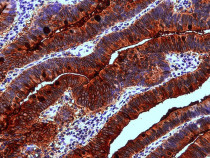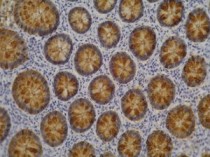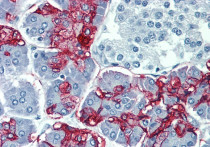ARG62692
anti-Blood Group Lewis a antibody [7LE]
anti-Blood Group Lewis a antibody [7LE] for ELISA,IHC-Formalin-fixed paraffin-embedded sections,Western blot and Human
Cell Biology and Cellular Response antibody
Overview
| Product Description | Mouse Monoclonal antibody [7LE] recognizes Blood Group Lewis a |
|---|---|
| Tested Reactivity | Hu |
| Tested Application | ELISA, IHC-P, WB |
| Specificity | The clone 7LE recognizes Lewisa blood group antigen, a carbohydrate determinant carried on both glycolipids and glycoproteins, expressed in colonic epithelial cells. Lewisa may be useful for detection of gastrointestinal, pancreatic and colorectal tumors. |
| Host | Mouse |
| Clonality | Monoclonal |
| Clone | 7LE |
| Isotype | IgG1 |
| Target Name | Blood Group Lewis a |
| Immunogen | Mucin isolated by size-exclusion chromatography from an ovarian cyst fluid (pure endocervical type according to the Fenoglio´s classification). |
| Conjugation | Un-conjugated |
Application Instructions
| Application Suggestion |
|
||||||||
|---|---|---|---|---|---|---|---|---|---|
| Application Note | IHC-P: Heat mediated antigen retrieval (sodium citrate); mAb incubated for 1 hour at RT; Detection DAB * The dilutions indicate recommended starting dilutions and the optimal dilutions or concentrations should be determined by the scientist. |
||||||||
| Positive Control | IHC-P: Colorectal adenocarcinoma |
Properties
| Form | Liquid |
|---|---|
| Purification | Purified from hybridoma culture supernatant by protein-A affinity chromatography. |
| Purity | > 95% (by SDS-PAGE) |
| Buffer | PBS (pH 7.4) and 15 mM Sodium azide |
| Preservative | 15 mM Sodium azide |
| Concentration | 1 mg/ml |
| Storage Instruction | For continuous use, store undiluted antibody at 2-8°C for up to a week. For long-term storage, aliquot and store at -20°C or below. Storage in frost free freezers is not recommended. Avoid repeated freeze/thaw cycles. Suggest spin the vial prior to opening. The antibody solution should be gently mixed before use. |
| Note | For laboratory research only, not for drug, diagnostic or other use. |
Bioinformation
| Research Area | Cell Biology and Cellular Response antibody |
|---|
Images (3) Click the Picture to Zoom In
-
ARG62692 anti-Blood Group Lewis a antibody [7LE] IHC-P image
Immunohistochemistry: Paraffin-embedded Human colon adenocarcinoma tissue stained with ARG62692 anti-Blood Group Lewis a antibody [7LE].
-
ARG62692 anti-Blood Group Lewis a antibody [7LE] IHC-P image
Immunohistochemistry: Colorectal adenocarcinoma section stained with ARG62692 anti-Blood Group Lewis a antibody [7LE].
-
ARG62692 anti-Blood Group Lewis a antibody [7LE] IHC-P image
Immunohistochemistry: Paraffin-embedded Human pancreas tissue stained with ARG62692 anti-Blood Group Lewis a antibody [7LE].
Clone References










